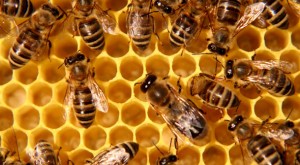
ANNAPOLIS — Maryland is set to become the first state to ban bee killing pesticides in the country, marking an important step in the effort to save its dwindling honeybee population.
Governor Larry Hogan is expected to sign the legislation that bans neonicotinoids, a potent class of pesticides used on many crops in the US that have been linked to the widespread decline of the honeybee population nationwide, from consumer use in Maryland.
House and Senate versions of the bill passed in recent weeks, and Hogan is expected to sign a unified version of the bill into law in the coming days.
While the bill wouldn’t stop farmers from using the pesticides, the bill, which would take effect in 2018, would prohibit the everyday consumer from using the harmful pesticides on their personal gardens or plants.
“This bill would be a big step in the right direction,” said Dean Burroughs, a longtime apiary inspector on the Eastern Shore of Maryland. “We have been losing so many of our pollinators in recent years and it’s all of our responsibilities to make things better for the environment and to save the bees.”
Colony Collapse Disorder (CCD), or the widespread die-off of bees, has been particularly bad in the state of Maryland. Last year, Maryland lost more than 60% of its bee hives, each with up to 20,000 bees. The national average of CCD in 2015 was a little more than 42%.
Delegate Anne Healey (D-Prince George’s County) authored the house version of the bill and hopes the bill will inspire other states to take action.
“Our honey bees are in serious trouble,” said Healey. “If we lose our bees and our other pollinators, one third of our food supply is in danger.”
Here on the shore, bee populations have been struggling, too.
“I manage more than 700 hives around the region and I’ve seen it be somewhere between 40 and 50% in loss of entire hives each year,” said Burroughs. “I’ve been doing this for 32 years, and I’ll be honest, 30 years ago, you’d maybe only lose 10 percent of your hives after the winter.”
Burroughs is not alone in his assessment. Bee populations all over the country have been plummeting in recent years, with the Environmental Protection Agency (EPA) launching an investigation on the impacts of different types of pesticides that have been linked to colony collapse of bees. Those findings are due in 2018.
Neonicotinoids have been banned in a number of countries around the world, and recent global studies point to the chemical pesticides as one of the leading factors in bee death, but the pesticides are still widely used here in the states.
Yet, the Maryland Department of Agriculture disagrees with the bill, and while it publically stated that it is concerned about the decline in the bee population, it believes that there is little scientific evidence linking CCD to neonicotinoids.
The chemicals are found in many products that can be found at local home and garden stores, and if the bill passes, consumers would be banned from those products.
The Department of Agriculture has also publically scrutinized the bill’s call for $200,000 in implementation and enforcement measures.
Another argument coming from opponents of the bill is that pesticides are not the only thing killing the bees at rapid rates.
“This varroa mite virus that is killing the bees is just as bad as the pesticides,” said Burroughs.
Varroa mites, or Varroa destructors, are external parasitic mites that attack honey bees and pass on a virus called varroosis. Essentially, the mites attach to the bodies of honey bees and spend their entire lifecycle sucking the bees dry of their hemolymph.
“Over the past 25 years, the bees have not adjusted to the mites,” said Burroughs, “but with the growth of big agriculture and the widespread usage of these pesticides, the combination of the two is really creating a big problem for the bees.”
Yet, Burroughs and other beekeepers around the state are optimistic that if Hogan signs this bill into law, Maryland will become an example to other states that in order to solve the problem of CCD, you must first admit that there is in fact a problem.
Several other states, such as California, Alaska, New York and Massachusetts, have made similar attempts to ban neonicotinoids, but none of those attempts have made it as far in the process as Maryland.
“There is a lot of awareness now to what the bees are facing,” said Burroughs, “I am hopeful for the future and I think if more states follow Maryland’s lead, we can turn this around. Bees are resilient and fascinating creatures.”
